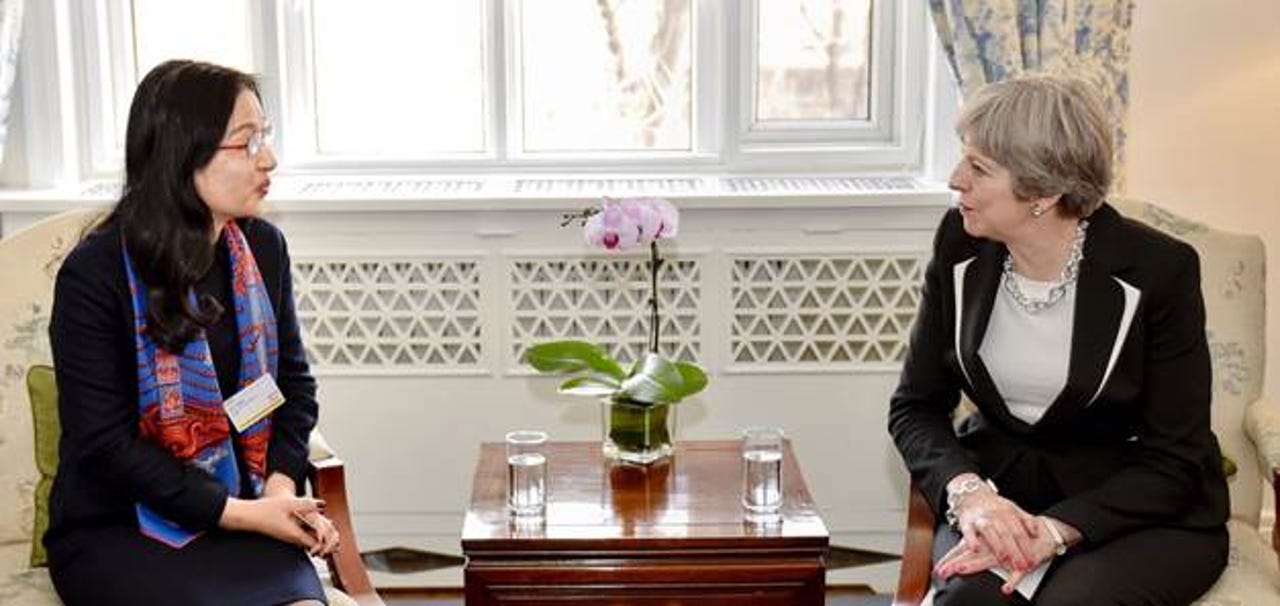Huawei announces £3b UK procurement plan


Huawei chair Sun Yafang with UK Prime Minister Theresa May
Huawei has committed to £3 billion in procurement over the next five years in the United Kingdom, saying it will assist local companies increase their exports to China.
According to Huawei, the deal, announced by Huawei chair Sun Yafang following a meeting with Prime Minister Theresa May in Beijing last week, demonstrates the Chinese tech giant's "long-term commitment to the UK".
"Huawei's £3 billion announcement is yet another significant vote of confidence in our world-leading tech industry, and I'm delighted to welcome their increased commitment to the UK," International Trade Secretary Liam Fox said.
"With 90 percent of global growth forecast to come from outside the EU, my international economic department is working to ensure Britain continues to benefit from the vast opportunities available as we leave the EU."
Sun Yafang pointed out that the UK was one of the first markets Huawei entered internationally, opening an office there back in 2001.
"We have now been working with our major customers in the UK for more than 12 years, helping to build a better connected UK," she said.
"Over the coming years, we look forward to continuing to collaborate with our customers and partners to help keep the UK at the very forefront of the digital age."
Huawei added that it had also "significantly exceeded" its previous pledge to invest and procure £1.3 billion in the UK between 2013 and 2017, having actually invested and procured £2 billion in that time. Huawei now accounts for over 1,500 jobs across 15 offices in the UK.
"Thanks to the drive and innovation of UK business, backed by this government, trade between the UK and China is already at record levels. This visit is an opportunity to further showcase the best of British and boost jobs and prosperity throughout the UK," May said.
One of Huawei's major investments in the UK was the 5G Innovation Centre (5GIC) at the University of Surrey, which is also supported by UK telecommunications regulator Ofcom; operators Vodafone, BT, O2, Telefonica, and EE; tech companies Fujitsu and Samsung; mobile radiocommunications equipment manufacturer Rohde & Schwarz; and the BBC.
Working with the 5GIC are the UK government's Department of Treasury, Chancellor of the Exchequer, and the Department of Culture, Media and Sport (BCMS), which oversees the telecommunications sector in the UK.
The centre got off the ground at the end of 2015, after the government went to tender for large innovation projects where it advised that it would kick in between £10 million and £100 million -- as long as the project received twice as much funding privately.
According to 5GIC COO Keith Robson, Huawei has been a "stalwart" since the beginning of the centre, supplying funding as well as the kit and support for the 5GIC's research experiments, with the centre now amounting to being the UK government's primary 5G innovation hub.
Huawei additionally partnered with Vodafone to launch an open lab in Newbury dedicated to the research and development (R&D) of narrowband Internet of Things (NB-IoT) technology and applications.
The lab provides a testing environment for application developers and chip, module, and device manufacturers.
Globally, Huawei spent 76.4 billion yuan on R&D during 2016, which amounted to 14.6 percent of its total revenue.
Last week, IDC revealed that Huawei's full-year smartphone shipments for 2017 reached 153.1 million, ranking third globally behind Samsung, at 317.3 million, and Apple, at 215.8 million. Huawei held 10.4 percent of 2017 market share.
In China, Huawei continues to hold the top spot thanks to shipments of 90.9 million and a market share of 20.4 percent for 2017, up from 16.4 percent in 2016, IDC said earlier this week.
Related Coverage
Latest iOS 11.3 beta adds battery health settings
As promised by Apple, features to check battery health and disable battery performance throttling on iPhone are now available to developers for testing before a wide release.
ZTE unveils 5G network slicing solution
ZTE has announced the launch of its cloud-based end-to-end 5G network slicing solution.
Mobile device computing policy (Tech Pro Research)
Mobile devices offer convenience and flexibility for the modern workforce-but they also bring associated risks and support issues. This policy establishes guidelines to help ensure safe and productive mobility.
Verizon and Samsung demo 5G call with KT
Using a prototype 5G tablet from Samsung, Verizon and KT have announced completing a 5G video call between Seoul and Minneapolis.
Samsung launches dual camera solution for budget phones
Samsung's ISOCELL Dual offers a dual image sensor with its self-developed algorithm, and is aimed at budget smartphone makers.
Why using blockchain to track cobalt mining could lead to more ethical smartphones (TechRepublic)
Cobalt mined in Congo typically ends up in lithium-ion batteries, but sometimes can run through children's hands to get there.
5G mobile networks: A cheat sheet (TechRepublic)
As LTE networks become increasingly saturated, mobile network operators are planning for the 5G future. Here is what business professionals and mobile users need to know about 5G.